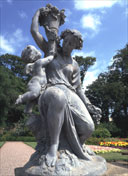 |
||||||||||||||||||||||||
|
|
||||||||||||||||||||||||
 |
|||||||||
 |
|||||||||
|
Its long sandy beaches, colourful atmosphere, paddler-friendly waters and first class attractions are the essential ingredients for a magical family holiday. During the summer months life seems to revolve around the seafront which comes alive to the sound of laughter and holiday fun. But there is also another side to this distinctive seaside town, which can be found in the elegance of Oldway Mansion, the stories of old Paignton told at 500 year old Kirkham House and the green coastline around Elberry Cove. By day there are attractions galore – Paignton Zoo, Quaywest Waterpark and the Paignton to Dartmouth Steam Railway. By night Paignton's seafront comes alive with illuminations and is perfect for an evening stroll.
|
|||||||||
|
Paignton was described only a century and a half ago as a “neat and improving village and bathing place”. This understates its story as it has ecclesiastical origins going back to medieval times and in the 17th century was referred to as “the manor and borough of Peynton. Although at the centre of the Bay, Paignton was less attractive for the merchant and fishing fleets which preferred the more sheltered quays of Brixham and Torquay, however, there are references to Paignton’s harbour as early as 1567. Always an attractive sandy beach the sands and dunes at Paignton needed a sea wall and promenade to stop erosion. There were constructed in the 1860s and the town bought the foreshore from the Duchy of Cornwall for £256
Now part of the Redcliffe Hotel was built in the 1850s and from the sea the battlemented tower and domed wings create a very oriental impression. Paignton Pudding For centuries Paigntonians have been known as “pudden-eaters” because of the pudding that was part of its history for seven centuries since the granting of the town’s charter in the 13th century. To celebrate the opening of the railway line into Paignton in 1858 the town laid on a vast party on the Green. Guests were fed with a giant one and a half ton Paignton Pudding made from flour, suet, raisins and eggs and costing and immense £45. The Paignton Pudding has been revived at times over the years but the last pudding to be made was in 1968 when 1,542 portions, in special souvenir dishes, were sold for charity.
|
|||||||||
